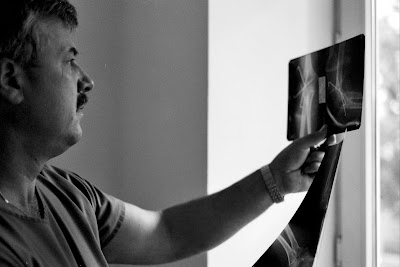



TRANSCARPATHIA, UKRAINE–In the morning we drove to Muncachevo with Dr. Yuri Demjan. He drove fast, handling the car well but impatiently as if he might intimidate it into going faster and the cars around it slower. Demjan is a big bear of a man, a Ukrainian orthopedic surgeon that SARA has brought to the US for extra training, particularly in scoliosis correction.
At the Regional Children’s Hospital he charged through his morning consultations: a little girl with a burn-scarred scalp, a boy with a badly broken leg he had operated on earlier, another boy with a sunken chest and finally a Svetlana Perminova, a 18-year-old Russian girl with an asymmetrical chest. A year before she had had her scoliosis corrected at Shriner’s Hospital in Erie, Pennsylvania with SARA funding. Projects like this, that find and help pay for people like Svetlana to have surgeries that can both save their lives or, especially in a case like her’s, completely alter the quality of it, are a large part of what SARA does. Rev. Szylagi and I went back a few weeks later to visit her in the hospital. She was smiling, sitting with her mother, a little shy about her English but happy and eager to talk about how her life would be different now. “Look at her,” said Szylagi enthusiastically, “She is a beautiful girl but before, before this surgery and especially before coming to Shriner’s, she couldn’t stand up straight, she was in pain. Now she has the confidence to go out in the world, find a job, go to school, have a family.” And it was true. The difference between the photos of her a year before, her thin body twisted and bent, and the undeniably beautiful and confident girl who sat in front of me and talked in halting English, was incredible. I thought, as well, that her’s was only one of hundreds and hundreds of surgeries and other medical procedures around the world that SARA has taken a hand in making possible–that hundreds of Svetlanas now had chances at normal lives because men like Dr. Demjan had trained in the US and brought their knowledge home.
We changed into scrubs and were soon into the first surgery, the boy with the sunken chest. The operation was quick and efficient. The patient was put under, the operating field was sterilized and isolated and two incisions were made on either side of his chest. Curved metal bars were inserted from one incision to the other, flipped with special wrenches and the chest thus expanded.
I had not slept well the night before and towards the end of the first surgery I began to fade. The thing with surgery pictures, unless you are documenting a specific procedure for medical people, is that after a while they pretty much look alike–masked people of various heights arranging themselves in a tableaux around a big green sheet with a small square of bloody flesh at the center.
The operating room itself was separated but its door opened onto a prep room with a door open to the outside. I went out on the balcony there and sat down on a mouldering canvas stretcher and promptly fell asleep with Leica’s dangling from my neck. They finished the boy and found me snoring on a Russian military stretcher there on the balcony on a gently raining day.
“We find you a room to sleep,” said Yuri, “Next surgery long.”
“Thank-you,” I replied.
“You want we send you girl?” he said, laughing and grinning.
“Make it two girls and a bottle of vodka,” I shot back, not to be intimidated by a little Russian leg-pulling.
“Ha ha! You want big girls?” he said and stretched his burly arms out to a span that even in jest was terrifying.
A silent Russian nurse made up a hospital bed for me with fresh sheets. She left and I lay back on a nicely plumped pillow and I read from a copy of The Lord of the Rings that I had brought with me. I had just finished The Council of Elrond when I fell fast asleep to strange dreams. I was awakened by a different, equally silent nurse who led me to the balcony. Yuri was in the parking lot, “Surgery finished quick. C’mon, c’mon, we go. Time to eat.”
And thus began, quite fittingly, my month in Ukraine, always a little tired, always rushing from one place to another and always, just around the corner, another meal.


Post a Comment